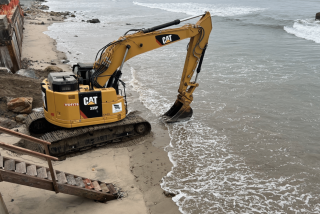Public’s Use of Beach Is Affirmed
The long-running scuffle over public access on Broad Beach in Malibu took another twist Friday when the California Coastal Commission ordered an end to the posting of no-trespassing signs and the use of security guards on all-terrain vehicles to chase visitors off the dry sand.
In a unanimous decision, with one commissioner recusing herself, the panel issued a cease and desist order against a Broad Beach homeowners association, whose motorized beach patrols are known for their tough treatment of nonresidents.
The order, approved by the other eight commissioners present, prohibits homeowners from maintaining “Private Property, No Trespassing” signs along the beach without state permits. State law allows such signs on land that is clearly private. The 12-member panel is charged with overseeing development and protecting public beach access along the state’s 1,100-mile coast.
Kenneth Ehrlich, an attorney representing the homeowners, said he was disappointed by the decision, adding that the signs were taken down eight months ago and security guards have not ridden ATVs on the beach for more than a year.
“From our perspective, all of these activities have stopped,” Ehrlich said. “It feels punitive to say stop something we’re not doing.”
But Lisa Haage, the Coastal Commission’s chief of enforcement, said the on-and-off use of guards and signs has gone on for several years, particularly in the summer.
Without the order, “there’s nothing to prevent them from bringing in more signs or more guards or more ATVs,” she said. “If they really didn’t intend to put up anything again, the order shouldn’t hurt them.”
The cease and desist order is the latest chapter in a drawn-out feud over public access and private property rights of the area’s homeowners, who include wealthy business leaders and celebrities, among them Goldie Hawn, Steven Spielberg, Dustin Hoffman and Danny DeVito.
There have been numerous complaints from beachgoers about signs and harassment from guards on the 1.1-mile swath of beach.
Frank Angel, who lives just north of Malibu, told the commission on Friday about an unpleasant encounter with the security guards.
Visiting Broad Beach in July 2003, Angel said, he and his then 12-year-old daughter were on the beach less than five minutes when a security guard on an ATV drove up and curtly told them they were trespassing on private property.
“It was a very brutal kind of the thing. My daughter was near tears.... They said, ‘We’ll call the sheriff if you don’t move,’ ” said Angel, 52. “I found it very degrading.”
Angel said he later checked a map on the Coastal Commission website and saw that he and his daughter had been standing on public beach.
At the hearing, commission staff showed slides of improperly placed signs staked in wet sand.
Wording on one sign indicated that the public beach began toward the ocean 30 feet away. Another picture showed a staff member who measured that distance standing in knee-deep surf.
“It’s pretty clear they’re directing people into the water,” said Commissioner David Allgood. “It sounds to me like [homeowners] are not trying to protect private property but trying to bully the public away. And I find that discomforting.”
The commission had indicated it would issue the cease and desist order a year ago but then tried to negotiate a settlement with the homeowners group, the Trancas Property Owners Assn. Negotiations broke down after Broad Beach homeowners brought in bulldozers and, without a state permit, scooped sand off the public beach and built a berm that impeded public access to the beach. The commission is considering that issue separately.
Those who violate the order can be fined from $1,000 to $15,000 per infraction each day until the order is followed.
Commissioner Sara Wan, who recused herself from the vote, said she had been the subject of numerous personal attacks and accused of bias by the homeowners group after she had a confrontation on the beach with security guards and five sheriff’s deputies two years ago.
She had gone to the beach to find out if the complaints the commission had been receiving were true. She was accosted after she sat down on what she contended was public beach. No action was taken after she produced documents showing that she had a right to be where she was.
“I think the results are to be expected,” she said after the vote. “The law’s very clear about the public right to access beaches. The fact that they’re fighting it tells me that if the commission didn’t [issue the order], you’d see signs up again, maybe not tomorrow but it might be five years from now.”
The conflict at Broad Beach is different from most spats over public access to the shoreline. The newly opened pathway near DreamWorks SKG co-founder David Geffen’s Malibu home a few miles down the coast is an example of a vertical easement, or an avenue for the public to cross private property to get from the nearest road to the beach.
The Broad Beach scuffle instead centers on lateral easements, which run along the shore and abut the seaward edge of homeowners’ properties. The easements are usually 25-foot-wide strips of sand beginning at the mean tide and were often designated when homeowners expanded their residences.
Of the 108 lots at Broad Beach, almost half have public easements, resulting in a checkerboard of public and private beach. A map showing where the public has access is on the commission’s website, www.coastal.ca.gov/web.Beach access advocates applauded the commission’s action Friday. “This sets down the standard,” said Steve Hoye, executive director of the nonprofit Access for All. “It says we’re not going to take egregious behavior, we’re not going to take intimidation....
“We’re going to follow the law.”
More to Read
Sign up for Essential California
The most important California stories and recommendations in your inbox every morning.
You may occasionally receive promotional content from the Los Angeles Times.










